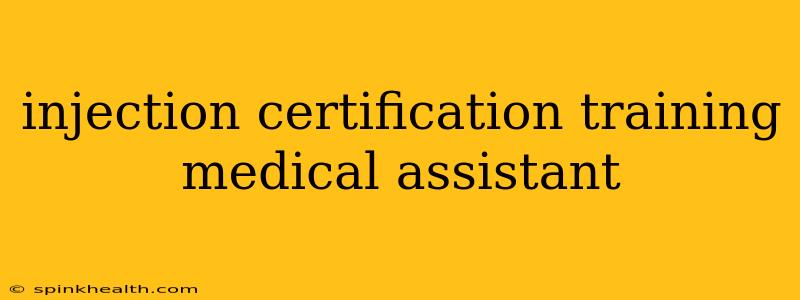Mastering the Art of Injections: A Medical Assistant's Journey to Certification
The sterile gleam of a syringe, the quiet confidence in a steady hand – these are the hallmarks of a skilled medical assistant proficient in administering injections. But achieving this level of expertise requires dedication, rigorous training, and ultimately, certification. This isn't just about learning a procedure; it's about mastering a critical skill that directly impacts patient care and well-being. My journey to injection certification as a medical assistant was a transformative one, filled with challenges, triumphs, and a profound sense of accomplishment. Let me share my story and answer some common questions along the way.
What are the different types of injection certification programs available for medical assistants?
The path to injection certification isn't a one-size-fits-all approach. Many different educational institutions and professional organizations offer courses tailored to medical assistants. These programs vary in length, intensity, and the specific types of injections covered. Some focus solely on intramuscular (IM) injections, while others incorporate subcutaneous (SQ) and intradermal (ID) injections. It's crucial to research programs carefully, considering factors such as accreditation, course content, instructor experience, and practical training opportunities. Look for programs that offer hands-on practice with simulated patients and real-world scenarios, mirroring the actual clinical setting. The ultimate goal is to develop the skills and confidence to administer injections safely and effectively.
How long does it typically take to complete an injection certification program?
The duration of injection certification programs varies significantly. Some accelerated courses might be completed within a few days or weeks, concentrating intensely on the core skills and knowledge required. Others offer more comprehensive training that stretches over several weeks or even months, delving deeper into relevant anatomy, physiology, and pharmacology. The length of the program often correlates with its depth and the breadth of injections covered. For instance, a program focusing solely on IM injections might be shorter than one that includes SQ, ID, and potentially intravenous (IV) injections (though IV injections often require separate, more extensive certification). Choosing the right program depends heavily on your existing knowledge and the level of expertise you want to achieve.
What are the prerequisites for enrolling in an injection certification program?
Most injection certification programs for medical assistants have prerequisites, although the specific requirements can differ between institutions. Generally, you'll need to be a certified or registered medical assistant (CMA or RMA). This demonstrates that you already possess a foundational understanding of medical practices, patient care, and safety protocols. Some programs might also require a certain level of prior experience working in a clinical setting, showcasing your practical familiarity with medical procedures. Others might necessitate successful completion of specific prerequisite courses, such as anatomy and physiology. Always check the specific requirements of the program you're interested in to avoid any delays or disappointments.
How much does injection certification training cost?
The cost of injection certification training varies depending on several factors. The length of the program, the institution providing the training, the location, and the inclusion of additional resources all contribute to the overall price. Some programs might offer payment plans or financial aid options to make the training more accessible. It's essential to obtain a detailed cost breakdown from each program you're considering before making a commitment. Weighing the cost against the potential career advancement and increased earning potential associated with injection certification is crucial in evaluating your investment.
What are the career benefits of injection certification for medical assistants?
Earning injection certification significantly enhances a medical assistant's career prospects and value. It opens doors to a wider range of job opportunities, allowing you to perform a more comprehensive set of tasks within a clinical setting. This can lead to increased responsibilities, higher earning potential, and a greater sense of professional fulfillment. Furthermore, mastering injection techniques demonstrates a higher level of competency and expertise, making you a valuable asset to any healthcare team. This specialized skill can also enhance your marketability and make you a more competitive candidate for desirable positions.
My journey to injection certification wasn't easy, but it was profoundly rewarding. The satisfaction of mastering a critical skill, the confidence of providing safe and effective patient care, and the positive impact on patient outcomes made every challenge worthwhile. If you’re a medical assistant considering this path, I wholeheartedly encourage you to take the leap. The journey is demanding, but the rewards are immeasurable.

